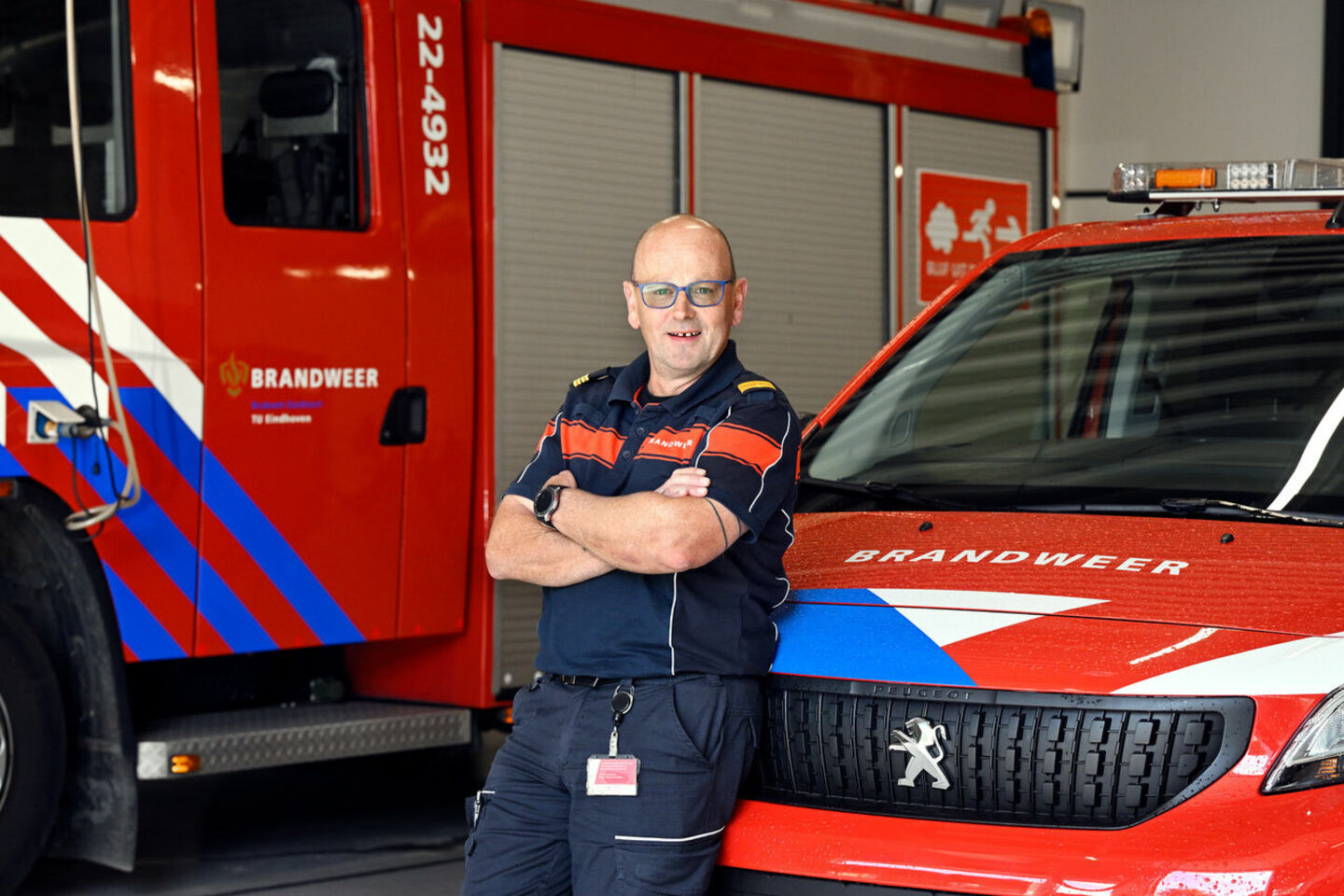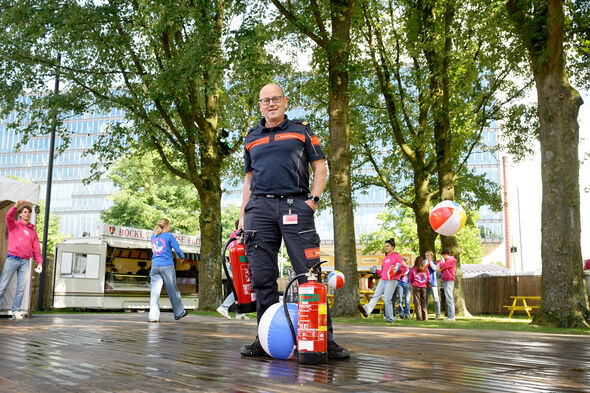
Behind the Scenes | Eric van der Heijden, TU/e fire chief
“I am the only university fire chief in the Netherlands”
Keeping a university running is no easy feat. It takes a lot of hands to make sure everything is in order, from administration to cleaning and from security to technical maintenance. Who are the unsung heroes behind the scenes keeping everything on track? In this series, Cursor shines the spotlight on TU/e employees. Today: Eric van der Heijden, commander of the TU/e fire department.
Back in 1960 – about four years after the university was founded – TU/e's in-house fire department was created. Over the years, other Dutch universities have also had their own fire departments, but currently TU/e is the only one with its own university fire department. “So that makes me the only university fire chief in the Netherlands,” Van der Heijden says with a laugh.
The team he manages consists of seventeen people. Four of them, including himself, work as professional firefighters at the barracks. The other thirteen are volunteer firefighters. They work in a wide variety of positions on campus, from education to real estate, but when an alarm goes off they arrive on the scene as soon as possible to reinforce the fire team.
What time do you clock in?
“We typically come in between 7:30 and 8 AM. Before that, from 05:30 AM onward, we’re on call. If we’re called, it’s usually the fire alarm system maintenance company.
There are about forty installations with a total of almost six thousand detectors on campus. Those often have to be tested and these tests produce a lot of noise, so this has to be done very early before the buildings are occupied. We’re the ones running the tests, but these days they can all be done remotely, luckily.”
What does your day look like?
“That really depends, every day is different. Of course we arrive on the scene when emergencies are reported. In 2023 this happened 88 times. Sometimes it concerns fire alarms that go off unintentionally after someone has burned sausage rolls, for example, but we also often get reports of accidents involving hazardous substances. If a test goes wrong, something may spill, explode, or catch fire. As there are various laboratories on campus, we have received extra training with respect to incidents involving hazardous substances.
We also give solicited and unsolicited advice on fire safety (and general safety). We are involved in large events such as MomenTUm, the introduction week or the Hajraa volleyball tournament. Furthermore, we regularly make sure that detectors are switched on and off if there is any work being done somewhere that could release smoke or dust (as this may trigger false alarms, ed.), and of course we organize all off the Emergency Response courses and drills.”
What led you to your job?
“I started in 1991 in my own community, Luyksgestel, as a volunteer firefighter. It was my neighbor, who was also in the volunteer fire department at the time, who got me into it. I then completed a number of training courses and in 2007 I was able to turn my hobby into my job here at TU/e. It was something that just sort of happened.”
What is the best part of this job?
“What makes me happy is when we can all make sure that safety is guaranteed here on campus. If we manage that, we go home with a smile on our faces.”
And the least enjoyable part?
“I can't really say. To me, everything is either enjoyable or really enjoyable....
If I really had to say something, it might be when you get woken up by calls over silly things. For instance when students confuse my number with security and I get a call at 1:30 AM because they want to get in or out of a building. Little things like that.”
What has stuck with you the most?
“The incident that sticks with me the most is the elevator accident in what is now the Luna building. At the time, that was being converted from the department building to the residential building it is today. An external contractor was working there when an elevator car with two employees fell down seven stories. One of them died and the other one was seriously injured.
I was there at the scene. There were two of them lying on top of the elevator car. The deceased victim was on top, so that one had to be removed first. And then we extracted the second victim as gently as we could and put him on the stretcher. He survived, but suffered a spinal cord injury.”
Eric and his colleagues can get support after serious incidents from the safety region. In their office there is a large poster with the names and numbers of all the support workers.
What time do you clock out?
“We go out with the fire truck until 4:30 PM, so we’re on campus until then. After that, the baton is handed over to the regional fire department.
However, one person from our own team is always on call in the evenings and on weekends. So if something happens on campus they can support the regional fire department, because of course we know our way around here a lot better.”
What do you do off the clock?
“My biggest hobby is motocross racing. I have been actively involved in that for about fifteen years and I am currently president of the motocross club in Hapert. My children were also into it for a while, but in the end chose soccer.”


Discussion